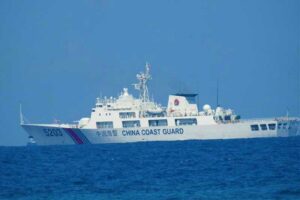
Philippines told to boost maritime ties with ASEAN
THE PHILIPPINE Coast Guard (PCG) should also boost maritime cooperation with other Southeast Asian nations other than Vietnam amid the slow development in the push for a code of conduct (CoC) in the South China Sea, an analyst said.
A possible cooperation deal between the Philippine Coast Guard (PCG) and its Vietnamese counterpart, which they have been working on since 2018 and is expected to be sealed this month, could be an “informal model” for the proposed South China Sea code of conduct, said Joshua Bernard B. Espeña, who teaches international relations at the Polytechnic University of the Philippines.
“It is an opportunity to provide an informal model for a yet to be concluded ASEAN-China Code of Conduct for parties in the South China Sea,” he said in a Facebook Messenger chat.
Mr. Espeña said the “lack of operational models for a legally binding instrument” has delayed the approval of the code of conduct.
The Philippine Coast Guard on Tuesday gave a “comprehensive briefing” to Vietnamese officials, including Vietnam’s Standing Deputy Minister of Foreign Affairs Nguyen Minh Vu and Ambassador to the Philippines Lai Thai Binh, on Manila’s maritime security operations in the South China Sea.
The two countries also sought to advance a memorandum of understanding (MOU) between the PCG and its Vietnamese counterpart, which they have been working on since 2018.
The proposed cooperation deal is expected to be sealed during President Ferdinand R. Marcos, Jr.’s visit to Vietnam next week. Mr. Marcos, 66, said during his visit to the United States last year his government was seeking to set up a separate code of conduct with Vietnam and Malaysia.
The Philippine leader cited the slow progress of the code between China and ASEAN members.
“Pushing for another memorandum of understanding with Malaysia, for instance, can provide the Philippines a calibrated diplomatic shot to make regional stability one step closer compared with the past 30 years,” Mr. Espeña said.
“If so, Manila should work on these memos rather than grand arrangements like mini-CoCs to operationalize,” he said. “The best approach is the one that works. We must try another approach until something works.”
After the Philippines’ push for a separate code of conduct, China warned that any departure from the Declaration on Conduct of the Parties in the South China Sea, which provided the framework for the regional code, would be void.
“The key is pragmatism based on national interests that work on the ground,” Mr. Espeña said.
The Philippines, Vietnam, Brunei, and Malaysia — all ASEAN members — as well as Taiwan and China hold overlapping claims over some features in the South China Sea, which Beijing claims almost in its entirety.
Vietnam was said to be the “last man standing” in the South China Sea conundrum when the Philippines pivoted to China during the previous administration.
Hanoi conducted major expansion activities such as dredging and landfill work at most of its South China Sea outposts in 2022.
Mr. Espeña said despite rebuking the Philippines last year for putting buoys in the Spratly Islands, Vietnam has pursued closer ties with Manila.
“In other words, Vietnam deemed it better to work synchronously with the Philippines in this area than separately,” he said.
Mr. Marcos is expected to sign a five-year rice deal with his Vietnamese counterpart during his visit to the fast-rising global manufacturing hub.
Mr. Espeña said the Philippines should complement its fiery stance on its sea dispute with China with hard-knock capabilities on the ground.
“This point is necessary because Hanoi may not find Manila reliable soon if it is all bravado in statements but disconnected to the ground,” he said.
“This commitment includes sustaining Filipino operations with a logistically sophisticated network and an interoperable maritime force that can move, shoot, and communicate competently.” — Kyle Aristophere T. Atienza



